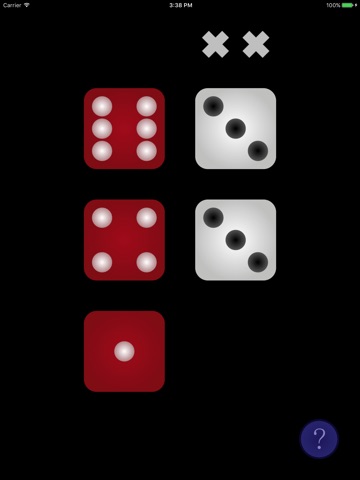
Dice Substitute app for iPhone and iPad
Developer: Frank Mezzatesta
First release : 22 Aug 2013
App size: 3.42 Mb
This app lets you quickly roll 1 to 5 dice. It has two intended use cases: with Risk (board game) and with games requiring one or two white dice.
• Roll dice quickly, in less than a second.
• Can be used with Risk (board game), indicator symbols tell you the result of the roll. Dice are also sorted and lined up for easy manual verification.
• Amount of dice can be quickly changed, in less than a second.
• Dice can be rolled continuously until you release your finger, if you so choose.
Instructions:
• Tap dice to toggle on/off
• Tap/Hold elsewhere to roll dice
Using this app with a Risk board game:
After each roll, little indicator Xs will show the result of the battle. For example, two red indicator Xs means that the red side (the attacker) lost two pieces in the battle. Each sides dice (red and white) will be sorted from highest to lowest to make manual comparisons easy, in accordance to the scoring rules of Risk.
Using this app with a game involving one or two white dice:
Disable all three red dice. This will leave you with two white dice (you may disable an additional white die from that point). Because there are no red dice, the Xs will not be displayed.
----
This app was tested to ensure that the dice generated are sufficiently random. The results of the tests demonstrate that this app provides for random dice rolls comparable to physical dice rolls. Here are the results from one test, performed on an iPad mini and on an iPhone.
Distribution of dice algorithm run six million times on an iPad mini*:
dice face ~ times occurred ~ offset from perfect distribution
1 ~ 999,818 ~ -0.0182%
2 ~ 999,623 ~ -0.0377%
3 ~ 999,971 ~ -0.0029%
4 ~ 999,588 ~ -0.0412%
5 ~ 1,000,992 ~ +0.0992%
6 ~ 1,000,008 ~ +0.0008%
Distribution of dice algorithm run six million times on an iPhone*:
dice face ~ times occurred ~ offset from perfect distribution
1 ~ 999,451 ~ -0.0549%
2 ~ 1,000,271 ~ +0.0271%
3 ~ 1,000,293 ~ +0.0293%
4 ~ 999,999 ~ -0.0001%
5 ~ 998,820 ~ -0.118%
6 ~ 1,001,166 ~ -0.1166%
*These numbers only represent two specific sets of gathered data. Running the test multiple times will yield slightly different results from those above, as it should. The point here is that the algorithm used to generate the die faces adheres closely to a perfect distribution model, with an acceptable error margin that is to be expected of randomly generated dice.
The results from another test (also conducted on an iPhone and an iPad mini) can be found at http://franklymodern.com/DiceSubstitute. The test results posted there demonstrate that the dice are random from roll to roll on a small scale.
Notice that the results vary slightly between the pairs of data sets within the test results. This observation, together with the results from the perfect distribution test and the small scale test, shows that these dice roll with a randomness comparable to the randomness of rolling physical dice.



